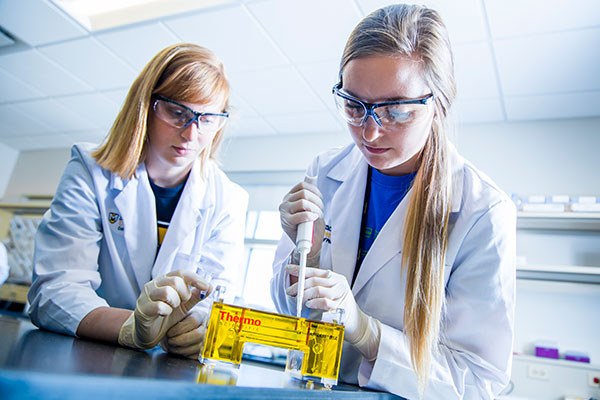PGx expands horizons

One year in, the revelation continues to amaze and delight David Kisor.
When you break trail, there’s always more trail to be broken.
And so after a successful inaugural year for Manchester University’s dedicated one-year Master of Science in pharmacogenomics program – the first of its kind – Manchester is upping the ante. In January 2018, MU will add an online PGx program, neatly merging visionary science with visionary educational technology.
Designed to be flexible and personalized, the online component is expected to extend the national and international reach of the program, a key goal in what’s seen as a rapidly expanding and ever-changing field.
“(The online program) is really gonna open a market that’s out there that otherwise wouldn’t be able to pursue this degree,” says Kisor, director of pharmacogenomics education. “It’s really important we do that, or we’re going to be left behind. Right now this is the only program (of its kind). But Shenandoah University is starting a program in the fall of 2018. So there’s gonna be competition going as this whole area grows.”
Unlike the on-campus model, the online version can be completed in as little as two years. Courses are seven weeks long and the cost will be $800 per credit hour plus $2,800 in fees.
“It’s part time,” says Diane Calinski, director of pharmacogenomics operations and the point person for the online program. “With the two-year structure, if the student has a project pop up or some type of family event coming up they can say, ‘OK, I know I can’t take classes for that seven weeks, but I’m not out for the whole semester. I can still take that seven-week course.’
“We also have it structured so if they want to take summers off they can do that. And I think that will happen a lot, too, with our adult-based learners.”
That sort of flexibility is expected to significantly enhance the overall growth of the PGx program. Although this year’s PGx cohort is small – four students – applications for next year have already exceeded those for 2017. The online program, plus the addition of a dedicated graduate admissions person in Julie Cogley, assistant director for enrollment and student services for pharmacy programs, has enhanced that process.
“That’s going to help tremendously,” Kisor says.
Also helping, no doubt, is that a PGx degree opens a multitude of employment opportunities.
One of the 10 inaugural PGx graduates, for instance, is in Massachusetts working for Veritas Genetics, a company that does whole genome sequencing. Another is working for Assurex Health in Mason, Ohio, a personalized medicine company that specializes in PGx. Still another is in Seattle, Wash., working for Translational Software, which provides reports on a variety of health topics including PGx.
“So we have students who literally have landed jobs from coast to coast,” Kisor says.
And who literally were involved in guiding a curriculum for which there was no definitive blueprint. Speaking of breaking trail.
“Yes, they’ve taught us quite a bit also,” Kisor says. “It wasn’t just a one-way deal this year for the first time around. I think where we were redundant with some things, they taught us how to streamline some things, but then also where to put different pieces of information, connecting to other things which they thought were important.”
That input will enable Kisor and the PGx faculty to tweak the program moving forward. The students in this year’s second class will therefore not have exactly the same experience the inaugural class did.
The very newness of the program, and of the science of PGx itself, virtually assured that would happen.
“We have no model for some of our classes,” Calinski says. “So we did a lot of (changing) from the first year to the second year, just a lot of rearranging the coursework. Just because the students said ‘Oh, this was covered kind of over here, it would be nice to have this information first.’”
And so the trail-breaking continues. As it must.
“I think we had a solid foundational start,” Kisor says. “(But) we have to be very diligent and really have our finger on the pulse of what’s happening in this area. Because PGx is changing so rapidly. It really is.”
-- Benjamin Smith